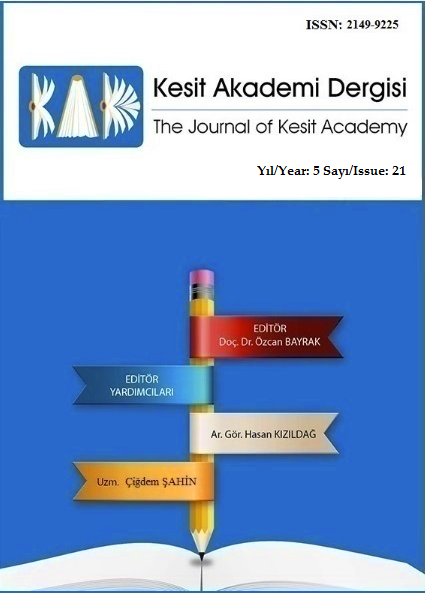Author :
Abstract
ÖZET Ekonomide ihtiyaç, karşılandığında bireye mutluluk veren, karşılanmadığı zaman ise elem ve üzüntü veren duygulardır. Mal ve hizmet satın alan her tüketici bundan en yüksek faydayı sağlamak ister. Satın alım sonrası bir sorunla karşılaşan tüketicilerin, tüketici hakları bilgi ve bilinç düzeyinin yaşanılan sorunun daha kolay çözümlenmesine katkı sağlayacağı bir gerçektir. Çalışma, ihtiyaçları doğrultusunda yüzlerce mal ve hizmet tüketen tüketicilerin, tüketim alanlarına göre tüketici hakları bilgi ve bilinç düzeyi arasında bir ilişki bulunmakta mıdır? Sorusuna cevap aranması üzerine temellendirilmiştir. Bu amaçla; Konya ilinin seçilen 6 ilçesinde yaşayan tüketicilere yönelik yüz yüze bir anket çalışması uygulanmıştır. Çalışma sonunda yapılan analizde, ilk üç tüketim tercihinden birini Seyahat( Beyaz eşya, Mobilya, Teknoloji, Temizlik maddeleri, Eğlence, Eğitim) olarak belirten tüketicilerin tüketici hakları bilgi ve bilinç düzeyi belirtmeyenlerden daha yüksek bulunmuştur. Çalışmadan elde edilen diğer bir sonuç ise tüketim alanlarında yapılan harcama sıklıklarının cinsiyete, yaş gruplarına, öğrenim durumuna ve medeni duruma göre anlamlı farklılık taşıması olmuştur.
Keywords
Abstract
The need in the economy is the feelings that give happiness to the individual when it is met, and it gives pain and sorrow when it is not met. Every consumer wants to get the most out of the product. It is a fact that the knowledge and awareness level of consumer rights of consumers who face a problem after the purchase will contribute to the solution of the problem more easily. In this study, the question “Is there a relationship between consumption areas and consumer rights knowledge and awareness level of consumers? was studied. For this purpose; A face-to-face survey was conducted for consumers living in 6 selected districts of Konya. As to the result of the the analysis of the study, the consumer rights knowledge and awareness level of consumers who marked one of the first three consumption preferences as Travel (White goods, Furniture, Technology, Cleaning agents, Entertainment, Education) were found to be higher than those who did not mark. Another result obtained from the study is that the frequency of expenditures in consumption areas has significant differences according to gender, age groups, education level and marital status.
Keywords
- Akipek, Ş. (1999); ‚ Türk Hukuku ve Mukayeseli Hukuk Açısından Tüketici Kredisi, Seçkin
- Akipek, Ş. (1999); ‚ Türk Hukuku ve Mukayeseli Hukuk Açısından Tüketici Kredisi, Seçkin Yayınları, Ankara
- Altunışık, R. ve Coşkun,R.,&Bayraktaroğlu,S.,&Yıldırım,E.,(2010). Sosyal Bilimlerde Araştırma Yöntemleri, SPSS Uygulamalı, Sakarya Yayıncılık, 6.Bası, Sakarya
- Aslan, Y. (1996). Tüketici Hukuku, Ekin Kitabevi Yayınları, Bursa.Aslan,Y.,(2015).Tüketici Hukuku,Ekin Kitabevi Yayınları,Bursa.
- Baudrillard, J. (1996). Société de Consommation, France, Gallimard.
- Baudrillard, J. (2012). Tüketim toplumu söylenceleri/yapıları. (Çev.: H. Deliçaylı ve F. Keskin) İstanbul: Ayrıntı Yayınları.
- Bauman, Z. (2010): Etiğin Tüketiciler Dünyasında Bir Şansı Var mı?, (Çev: F. Çoban-İ. Katırcı), De Ki Yayınları, Ankara.
- Baykan, R. (1996). Türkiye’de Tüketicinin Korunması Tedbirleri, Öneriler ve Ekonomik Etkileri, İstanbul Ticaret Odası Yayın No : 1996-23
- Baykan, R. (2005). Tüketici Hukuku Mevzuata İlişkin Yorum-Eleştiri-Öneri,Güncelleştirilmiş 2. Baskı, , İstanbul Ticaret Odası Yayın No : 2005-41
- Bocock, R. (2009). Tüketim. (çev. İ. Kutluk). Ankara: Dost Kitabevi Yayınları.
- Buğday, B. E. (2015). Bilinçli Tüketici Ölçeği Geliştirme Çalışması, Hacettepe Üniversitesi Sosyal Bilimler Enstitüsü Aile ve Tüketici Bilimleri Anabilim Dalı,Doktora Tezi.
- Chan, R.Y. K. ve Lau, L. B.Y. (2000). Antecedents of Green Purchases: A Survey in China. Journal of Marketing, 17(14), 338-357.
- Deryal, Yahya ve Korkmaz,Yakup (2015). Tüketici Hukuku,Ders Kitabı,Adalet Yayıne- vi,3.Baskı,Ankara.
- Douglas, M.ve Isherwood, B. (1999). Tüketim Antropolojisi. Ankara: Dost Kitabevi Yayınları
- Ede, F.O. ve Calcıch, S.E. (1999). ‚African Amarican Consumerism: An Exploratory Analysis and Clasification‛, American Business Review, 17 (1):113-122.
- Fiske, J. (1999). Popüler Kültürü Anlamak. (Çev.: S. İrvan). Ankara: Bilim ve Sanat Yayınları.
- Featherstone, M. (2013). Postmodernizm ve Tüketim Kültürü. (çev. M. Küçük). İstanbul: Ayrıntı Yayınları.
- Göle, C. (1983). Ticaret Hukuku Açısından Aldatıcı Reklâmlara Karşı Tüketicinin Korunması, Ankara: Banka ve Ticaret Hukuku Araştırma Enstitüsü Yayınları.
- Hannigan, John A. (1991). Social Movement Theory and the Sociology of Religion: Toward a New Synthesis, Sociological Analysis, 52 (Winter), 311–31.
- Karalar, R. (2001). Genel İşletme. Eskişehir: Anadolu Üniversitesi
- Kotler, P. (1997). Marketing Management, Prentice Hall Int. New Jersey
- Kozinet,V. V. ve Handelman,M. J. ( 2004). Adversaries of Consumption: Consumer Movements, Activism, and Ideolog, Journal of Consumer Research, 31(3) 691–704.
- Kongar, E. (1993). 12 Eylül Kültürü, Ankara: Remzi Kitabevi
- Marshall, G. (1999). Sosyoloji Sözlüğü, (Çev: O.Akınhay- D. Kömürcü), Bilim ve Sanat Yayınları, Ankara
- McGougall, G. H. G. (1993). The Green Movement in Canada: Implications for Marketing Strategy. Journal of International Consumer, Marketing, 5(3), 69-87.
- Odabaşı, Y. (1999). Tüketim Kültürü, İstanbul: Sistem Yayınları
- Odabaşı, Y. (2015). Tüketici Davranışı,İstanbul, Mediacat Akademi.
- Ross, J. (1964). Income Analysis and Policy, Mc Graw Hill Book Company: New-York, United States of America
- Sencer, M. Ve Sencer, Y. (1978). Toplumsal Araştırmalarda Yöntem Bilim, Orta Doğu Amme İdaresi Enstitüsü.
- Tokol, T. (1977). Pazarlama Açısından Tüketicinin Korunma Sorunu, Bursa İktisadi ve Ticari İlimler Akademisi Yayını. Ankara
- Torlak, Ö. (2000), Tüketim: Bireysel Eylemin Toplumsal Dönüşümü, İstanbul: Inkilab Yayınları.Ünlüören, K. (1999). ‚Turizm Sektöründe Tüketicinin Zararının Tazmin Edilmesi Hakkı Üzeri-ne Bir Araştırma‛, Gazi Üniversitesi Ticaret ve Turizm Eğitim Fakültesi Dergisi, Sayı: 2,s: 117-140.Üstün, B. ve Tutal, O. (2008). Tüketim Alışkanlıklarındaki Değişimler Ve Bu Değişimlerin Alış-veriş Mekânlarına Etkisinin Eskişehir Örneğinde İrdelenmesi. Anadolu Üniversitesi Sosyal Bi- limler Dergisi, 8(2), 259-282.
- Veblen, T. (2005). Aylak Sınıfın Teorisi. (Çev.: Z. Gültekin ve C. Atalay). İstanbul: Babil Yayınla- rı.
- Wasik, J. (1992). Green Marketing: Marketing is Confusing, but Patience,Will Pay Off. Marke- ting News, 26(24), 16-17.
- Weiss, D. (1985). Le consommérisme, 81e congrès des notaires de France sur le thème du consommateur, LPDA, 1e mai.
- Yanıklar, C. (2006). Tüketim Sosyolojisi. İstanbul: Birey Yayıncılık.
- Zorlu, A. (2008). Alışveriş Merkezlerini Anlamak, Ankara: Global Yayıncılık. Elektronik Kaynaklar
- http://www.resmigazete.gov.tr/eskiler/2013/11/20131128-1.htm http://www.tuik.gov.tr/Start.do





